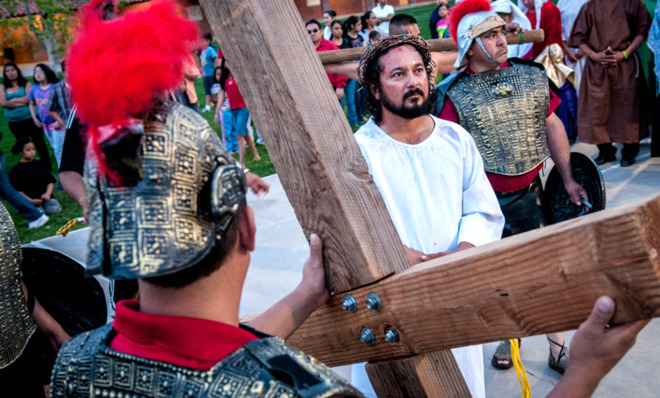How moderns celebrate Good Friday and Easter
Holy Week is occasion for both humiliation and a homecoming feast


I will make a new covenant with the house of Israel and the house of Judah, not like the covenant which I made with their fathers when I took them by the hand to bring them out of the land of Egypt, my covenant which they broke, though I was their husband, says the LORD... For I will forgive their iniquity, and I will remember their sin no more. (Jeremiah 31:31–32, 34)
As Holy Week for Christians comes to its crescendo on Good Friday, I'm more and more impressed with the way believers personally experience the crucifixion as a symphony of ironies that play out in the traditional liturgy of the church. Our priests act the part of wicked and vain priests, and our congregations act as religiously motivated mobs. Our adoration of God is commemorated by spitting on, mocking, and betraying Him, and eventually torturing Him to death.
For the uninitiated, the Scriptures often seem like a jumble of books that are somehow translated by religious authorities into a list of annoying rules to be followed. And the worship of the church, especially the old Latin Mass I have the pleasure of hearing, looks like an incomprehensible jumble, too: a mixture of near East and Roman, of Palestine translated through Baroque. It is as opaque as a stained glass window in the dark.
But I've discovered there's more to it. By fitful study, more fitful prayer, and mostly by simply enduring the Scriptures and the liturgy, something opens up. Interesting as they are, the various genres and literary coventions of the Bible, as well as the historical contingencies and enculturating revisions of the church's worship, recede into the background somewhat, revealing a larger, more comprehensible story about God's covenant with man.
The Week
Escape your echo chamber. Get the facts behind the news, plus analysis from multiple perspectives.

Sign up for The Week's Free Newsletters
From our morning news briefing to a weekly Good News Newsletter, get the best of The Week delivered directly to your inbox.
From our morning news briefing to a weekly Good News Newsletter, get the best of The Week delivered directly to your inbox.
When America's Evangelicals ask whether one has a "personal relationship with Jesus," they are hinting at this intimate participation in the story of God's intervention in the world. They understand that God's covenantal love for man is not a list of arbitrary rules. It does not look anything like an employment contract: do good works, punch the clock, and enjoy your 401K of merit on the sandy beaches of heaven's far shore. They know that God's covenant is like a marriage covenant, not an exchange of labor or goods. A covenant means I am yours, and you are mine.
And with that understanding the Scriptures and the liturgy becomes clearer. The Bible becomes a diary of God's great construction plan for his home, where he wants to dwell with his people. He is the master architect who builds a sanctuary in the Garden, making a covenant with one man, Adam. Then he makes a covenant with a family led by Noah, then a tribe whose patriarch is Abraham, then a nation with Moses as the leader of the people of Israel, then a Kingdom headed by David, all of which culminates in a covenant in God's own blood with a universal Church.
The worship of the Jews is centered around a tent, a Tabernacle, and later a full Temple that are built to be God's home, modeled after the pattern of many homes in Israel. The liturgy, our worship, is our attempt to act like we live in God's house.
When Christians go to their Holy Week liturgies they are being pulled into the culmination of God's home-making. Christ becomes the bridegroom from Cana, who has saved the good wine for "the hour" of his Passion, and the new wine he pours out for us is his blood. In the lead-up to these days we read of Jesus' encounter with the Samaritan women at the well, so redolent of Moses' encounter with Zipporah, his future wife. Jesus is symbolically making his marriage covenant with Gentiles as well as Jews, drinking wine at his Passion from a branch of hyssop as the consummation. We fast on Good Friday, as Jesus foretold in Mark's Gospel: The day will come when the bridegroom is taken away.
A free daily email with the biggest news stories of the day – and the best features from TheWeek.com
As we move in to Palm Sunday, the ironies become crushing. We come into God's house as religious people, as pious people, and together with our priests we spend our Holy Week acting exactly as priests and pious people have: as cowards and sadists, who would fail to recognize God even when He stands in front of us. We drag Him and mock Him like Lynddie England leading a prisoner through Abu Ghraib. Our Holy Week liturgies are just like that sickening selfie: We dare to throw incense before God's altar, and the smoke rises with the same humiliating insouciance as her lit cigarette.
We gather at the edge of the sanctuary, which is the symbol of the heavenly Holy of Holies, and re-enact the part of the vicious mob in Jerusalem who called for the death of God for the sake of God's name. We become the Roman torturers who mocked the King of the universe with a crown of thorns. We play the roles of the screaming and vain religious men, who work themselves into a fury. Our pastor intones the hysteria of the chief priest who condemned God Himself as a blasphemer. We once more present to God (and to ourselves) the bitter betrayals, laziness, and weakness of the Apostles after whom our priests are modeled — and who too often imitate their bad example.
And after all this, our own Via Dolorosa, we are finally prepared to hear the words, "Father, forgive them for they do not know what they do."
This re-enactment — in which reality is suffused with divine meaning — does not end with the liturgy at our Church and is not reserved for the devout or even the believing. Once this vocabulary for understanding the universe seeps into the imagination, the world takes on the same patterns. After God builds a three-story home at Creation he deputizes Adam as a kind of junior architect, another gardener who will "till and keep it," verbs used later to describe the duties of priests in the Temple. We are to imitate God, to build our houses and make covenants with one another. To create children and make them our sons and daughters, to gather the orphans into our own homes, to dwell together in love, to sacrifice for each other, to fight for each other as God has for us. And we're to have fun, too; to sweat over the ovens and feast together.
On this Good Friday morning, I will go to the butcher and buy racks of lamb at an extortionate price. On Sunday, we will return from Mass to my father-in-law's home, which, like the sanctuary, is a place of love. And I'll prepare the offering. The ribs will remind me of Christ's side, the side of the Temple, and the smoke will come like a wild offering from the oven. The devout and prodigals of our family will gather together for the holiday and to mark a few birthdays. We will put aside any previous hurts. There will be inside jokes, more good food, more games to play, more communion than any of us could have on our own. And around my father's table, well-fed, well-loved, and well-understood, we will have made an image of the heavenly banquet, of a New Jerusalem, of a paradise filled with laughter, forgiveness, the smell of spices, with play and rest. Heaven is a homecoming.
Michael Brendan Dougherty is senior correspondent at TheWeek.com. He is the founder and editor of The Slurve, a newsletter about baseball. His work has appeared in The New York Times Magazine, ESPN Magazine, Slate and The American Conservative.
-
 5 highly hypocritical cartoons about the Second Amendment
5 highly hypocritical cartoons about the Second AmendmentCartoons Artists take on Kyle Rittenhouse, the blame game, and more
-
 ‘Ghost students’ are stealing millions in student aid
‘Ghost students’ are stealing millions in student aidIn the Spotlight AI has enabled the scam to spread into community colleges around the country
-
 A running list of everything Donald Trump’s administration, including the president, has said about his health
A running list of everything Donald Trump’s administration, including the president, has said about his healthIn Depth Some in the White House have claimed Trump has near-superhuman abilities
